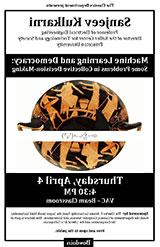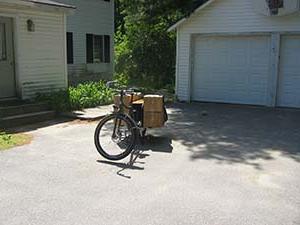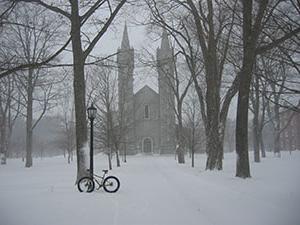Links useful to Classicists
These are online resources that I use frequently, and which will be useful to Classics students of all levels. Many of them will require that you access them either from a computer on the Bowdoin network, or employ Bowdoin’s VPN connection (I have marked these with a bracketed {B}). In order to set-up a VPN connection for the use of Bowdoin resources while off-campus, go here.
Texts
Greek Fonts – If you are using Greek at all it will save you much time and many headaches to install a good Unicode, Polytonic Greek font on your computer. This will allow you to read, and produce, Greek characters and diacritical marks. Bowdoin has a site license for the GreekKeys family of fonts, which work especially well on both the Macintosh and PC systems. Contact Carmen Greenlee for help on installation. A useful introduction to Unicode Greek can be found here, and an exhaustive and up-to-date page detailing the various options for both Mac and PC can be found here.
Perseus – A massive, online resource, which provides texts in Greek, Latin, Arabic, German, French, Italian and others. It also has an extensive library of photographed and catalogued objects, inscriptions, and papyri. Perseus is impossible to categorize, but a great place to explore. A more streamlined, efficient portal can be found through the University of Chicago’s Department of Classics, which provides a mirror site to Perseus here.
TLG – {B} – The Thesaurus Linguae Graecae represents the first effort in the Humanities to produce a large digital corpus of literary texts. Since its inception the project has collected and digitized most texts written in Greek from Homer (8 c. B.C.) to the fall of Byzantium in AD 1453 and beyond. Its goal is to create a comprehensive digital library of Greek literature from antiquity to the present era. TLG research activities combine the traditional methodologies of philological and literary study with the most advanced features of information technology.
PHI-Latin – The Packard Humanities Institute has created a website that contains essentially all Latin literary texts written before A.D. 200, as well as some texts selected from later antiquity. These texts were previously available on The Packard Humanities Institute's CD ROM 5.3. You can find a complete listing in the Canon of Latin Authors.
The Latin Library – Basic, easy to use, and useful.
Images
Beazley Archive Pottery Database – This is an ideal place to begin any research project involving Greek figural pottery. The search terms can be finicky, and the user-interface is not as intuitive as it might be (partly a function of its ground-breaking nature), but any time taken to explore it thoroughly will be richly rewarded! The original project, a database of Athenian figure-decorated pottery 626-300BC, began in 1979, and was adopted by the British Academy as an advanced research project in 1982. It was the second project at the University of Oxford to be available “on line” (after the Cairns Science Library). Beginning in 1992 the database, and others started in the early 1990s, began to be prepared for migration to the web. The project was originally funded by the AHRB 2003-2006, and represented the first stage of an integrated multiple database system available on the web. It now contains over 10TBs of data on Pottery, Gems and Sculpture, with more than 300,000 records and 200,000 high-resolution images on the web. Searches can be made across all types of material on the site. It receives about 200,000 hits per day and its most advanced database has more than 8,000 registered users worldwide. It is widely considered to be a model of what the “digital humanities” can do.
CVA – The Corpus Vasorum Antiquorum ('Corpus of Ancient Vases') is the oldest research project of the Union Académique Internationale. The database consists of a series of high-quality catalogues of mostly ancient Greek painted pottery in collections around the world. The first fascicule appeared in 1922 and since then around 380 have appeared, illustrating more than 100,000 vases in 24 countries. The three-year CVA Online project began in 2000, when Oxford University's Beazley Archive was invited to undertake the digitization of out-of-print fascicules. The digitized catalogues can be viewed and browsed through this site, which also provides links to the fully searchable Beazley Archive pottery database.
Oxford Art Online {B} – Oxford Art Online offers access to the most authoritative, inclusive, and easily searchable online art resources available today. Through a single, elegant gateway users can access—and simultaneously cross-search—an expanding range of Oxford’s acclaimed art reference works: Grove Art Online, the Benezit Dictionary of Artists, the Encyclopedia of Aesthetics, The Oxford Companion to Western Art, and The Concise Oxford Dictionary of Art Terms, as well as many specially commissioned articles and bibliographies available exclusively online.
ArtStor {B} – An online resource containing more than one million digital images relating to the arts, architecture, humanities and sciences.
LIMC – The Lexicon Iconographicum Mythologiae Classicae is now online and searchable, for free! It can be difficult to use (for example you have to click on the magnifying glass icon in the top left corner in order to begin searching), but it provides comprehensive resources for the study of classical religion and mythology. For a brief introduction to this source, see Phoebe Acheson’s useful review here.
Epigraphy
Greek Inscriptions – A database of Greek Inscriptions underwritten by the Packard Humanities Institute, and maintained by faculty at Cornell and Ohio State. This is useful for checking texts, as the inscriptions are clearly presented and easy to work with. You can search the texts using the java window at the bottom of your screen.
Use the following operators: | ^ = OR | & = AND | ~ = NEAR | ( ) = GROUPED
CSAD – The Centre for the Study of Ancient Documents was established in 1995 under the auspices of Oxford University's Faculty of Literae Humaniores to provide a focus for the study of ancient documents within Oxford. Over the last six years it has developed into a research centre of national and international importance. The Centre forms part of the Classics Centre, currently located in the Old Boys' School in George Street. The Centre provides a home for Oxford University's epigraphical archive, which includes one of the largest collections of squeezes (paper impressions) of Greek inscriptions in the world, together with the Haverfield archive of Roman inscriptions from Britain, the Vindolanda Tablets online, and a substantial photographic collection. The strengths of the epigraphical archive lie in its broad coverage of early Greek inscriptions, Attic epigraphy and the Hellenistic world. Individual sites well represented in the archive include Chios, Samos, Priene, Rhodes, and Samothrace.
OSU-CEP – The Center for Epigraphical and Palaeographical Studies at The Ohio State University is the only comprehensive research facility for the study of Greek and Latin inscriptions and manuscripts in the United States. Its purpose is to foster the study of inscriptions and manuscripts and promote research opportunities for those interested in these primary sources of information for the ancient and mediaeval world. The Center maintains an extensive collection of photographs and squeezes (accurate paper impressions of inscriptions) of Greek and Latin inscriptions and microfilms of Latin manuscripts.
Epigraphic Database Heidelberg – The Epigraphic Database Heidelberg (EDH) is the systematic entry of ancient Latin and bilingual (usually Latin and Greek) inscriptions into a complex database. A distinguishing feature of EDH is its regional focus, its capability of combining the stored metadata as freely as possible, and the reciprocal linking of the Epigraphic Text Database with both of the constituent databases of EDH, the Bibliographic Database and the Photographic Database. The goal of the project is to render the epigraphic documentation of the provinces of the Roman Empire as completely and reliably as possible for online research work. The Epigraphic Text Database is the heart of EDH and contains 65000 inscriptions at present. Almost all of the records present texts, which have already either been edited in the monumental Inscription corpora – in many cases still valid, but often do not fulfill the standards of modern textual editorial practice – or published, revised and discussed in thousands of scholarly articles. The texts and metadata of the inscriptions are thus presented on the basis of up to date scholarly research. One of the basic principles of the working method of EDH is that readings are not simply accepted from the editions and secondary literature. As much as possible these readings are verified at least on the basis of drawings or photographs – in the case of the latter these belong to the records of the Photographic Database – or ideally through autopsy. By means of the "status field" the user of the database is informed about the manner of verification of the readings.
EDCS – The Epigraphik Datenbank Clauss-Slaby is a database that records almost all Latin inscriptions. The texts are presented without abbreviations, and completed where possible. The presentation of the texts is kept as simple as possible. Beside the commonly used indications for resolution, completions and erasures, as few special characters as possible have been used. The abbreviations give the references for the publications used. The statistical data indicates which volumes (with how many texts per volume as far as the Latin inscriptions are concerned) are recorded completely in the database. As of 2011 650,859 sets of data for 445,006 inscriptions from over 1,800 publications for more than 21,300 places with 65,076 pictures have been recorded.
Numismatics
British Museum – The British Museum published most of its massive collection of Greek coins in 29 volumes from 1873-1929. The series, called BMC Greek, is the largest collection of ancient Greek coins ever published. This link provides an entry point to the various volumes and collections.
Historia Numorum – Barclay Head’s seminal work on Greek Numismatics, now digitized and online, for free.
ANS – The American Numismatic Society is a museum and research institute devoted to the study of coins from all periods and cultures. There is a wealth of information here, but one to keep particularly in mind is OCRE: The Online Coins of the Roman Empire.
SNG – The Sylloge Nummorum Graecorum is a British Academy Research Project, the purpose of which is to publish illustrated catalogues of Greek coins in public and private collections in the British Isles. SNG has retained the traditional, very broad, definition of 'Greek' to include the coins produced by all ancient civilisations of the Mediterranean and neighbouring regions except Rome, though it does include the Roman Provincial series often known as 'Greek Imperials'.
Papyri
Papyri.info – This site offers links to papyrological resources, a customized search engine (called the Papyrological Navigator) capable of retrieving information from multiple related collections, and an editing application, the Papyrological Editor, which contributors can use to suggest emendations to PN texts. The Papyrological Navigator aggregates and displays information from the Advanced Papyrological Information System (APIS), the Duke Databank of Documentary Papyri(DDbDP), the Heidelberger Gesamtverzeichnis der griechischen Papyrusurkunden Ägyptens (HGV), and Bibliographie Papyrologique (BP), as well as links to Trismegistos.
Michigan Papyri – The University of Michigan houses the largest number of papyri in North America, and remains a center for scholarly research in the field. The faculty have also put together a useful collection of links related to papyrology here.
Prosopography
LGPN – The Lexicon of Greek Personal Names was established to collect and publish all ancient Greek personal names, drawing on the full range of written sources from the 8th century B.C. down to the late Roman Empire.
PIR – The Prosopographia Imperii Romani provides a veritable “Who’s Who” of the Roman Empire. You’ll need a bit of German in order to navigate the site, but the online searching can be handy.
Greco-Roman Facebook – Well, not really, but this links to an interesting paper that provides a good introduction to the use of social network analysis in prosopographical approaches to the ancient world.
Lexica
LSJ – The “Big” Liddell, Greek-English Lexicon, provided courtesy of the Perseus Project. The “Middle” Liddell, which can sometimes be a bit more useful, can be found here.
Lewis & Short – The standard, large format Latin-English Lexicon, provided courtesy of the Perseus Project.
English-Greek Lexicon – S.C. Woodhouse’s classic aid for Greek Prose Composition students everywhere. Now digitized and hosted by the University of Chicago.
Smyth – Everything you ever wanted to know about Greek Grammar, but were afraid to ask.
Goodwin – The Syntax of the Moods and Tenses of the Greek Verb. Guaranteed to relieve stress and improve your outlook on life, since 1879.
Lexiphanes – The LSJ and Autenrieth’s Homeric Lexicon, squeezed in to your phone, or tablet. Crazy. Coded and supported by my friend Harry Schmidt.
Lexidium – A combination of Lewis & Short and a parsing tool for your iPod or iPad. Coded and supported by my friend Harry Schmidt.
Bibliography
L’Année philologique {B} – The essential bibliographic resource for all Classical disciplines. It is useful for finding books and articles on specific subjects or on particular ancient authors, and can be searched using a range of criteria, e.g. modern author, ancient author, keyword, subject, date, etc. It is also useful for decoding the various abbreviations used for journal titles.
TOCS-IN – This is a very simple, and user-friendly searchable index of the tables of contents from a selection of Classics, Near Eastern Studies, and Religion journals. This is often a good place to start a basic bibliographic search.
Gnomon – Also a collection of bibliographic citations, but also has a robust key-word tool, and catches items that appear neither in L’Année nor in TOCS-IN. It seems clunky at first, but once you familiarize yourself with its idiosyncrasies it can prove invaluable.
Dyabola {B} – A database of references to books, conference papers and journal articles produced by the German Archaeological Institute in Rome. Bowdoin does not have access to each and every feature (this will hopefully change in the near future), but it is especially useful when doing research on archaeological subjects.
Nomoi – A comprehensive bibliography of items related to Greek law. It is organized alphabetically by author, but you can search for keywords and terms using your browser’s search function.
Nestor – An international bibliography of Aegean studies, Homeric society, Indo-European linguistics, and related fields. It is published monthly from September to May (each volume covers one calendar year) by the Department of Classics, University of Cincinnati. The primary geographic nexus of Nestor is the Aegean, including all of Greece, Albania, and Cyprus, the southern area of Bulgaria, and the western and southern areas of Turkey. Nestor includes publications concerning the central and western Mediterranean, southeastern Europe, the eastern Mediterranean, western Asia, and other regions of archaeological research, if the specific bibliographic items contain Aegean artifacts, imitations, or influences, or make reference to Aegean comparanda.
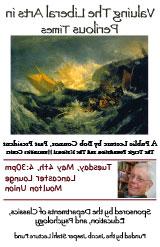 W. Robert Connor
W. Robert Connor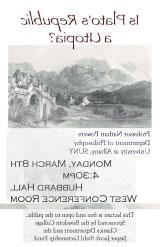 Nathan Powers
Nathan Powers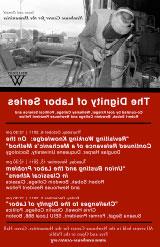 The Dignity of Labor Lecture Series
The Dignity of Labor Lecture Series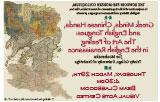 Joe Moshenska
Joe Moshenska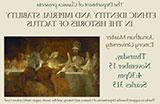 Jonathan Master
Jonathan Master